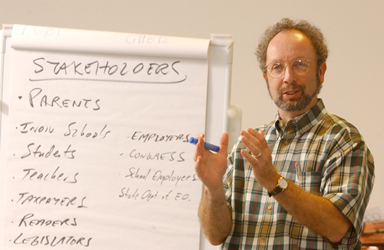Respecting Privacy Guidelines
By Bob Steele
When does the free flow of information that serves the public good outweigh the rights of individuals to personal privacy? That is a balancing act journalists regularly face.
Sometimes that question is applied to public officials who are accused of wrongdoing that involves their personal behavior.
Sometimes the privacy issue involves celebrities who seek media attention and bask in the spotlight, only to reject news coverage when it might tarnish their images.
And sometimes the privacy concerns apply to average citizens who are suddenly caught in the news by virtue of a tragedy or their connection to an otherwise newsworthy event.
The decisions individual journalists and news organizations make on these matters can have profound consequences. The challenge for journalists is to be professionally skilled and appropriately aggressive in seeking meaningful information that serves a legitimate public need to know, while being respectful and compassionate to those whose personal privacy may be intruded upon.
Journalists should ask themselves some important questions as they balance this public need to know with an individual’s right to privacy.
What is my journalistic purpose in seeking this information? In reporting it?
Does the public have a justifiable need to know? Or is this matter just one in which some want to know?
How much protection does this person deserve? Is this person a public official, public figure, or celebrity? Is this person involved in the news event by choice or by chance?
What is the nature of harm I might cause by intruding on someone’s privacy?
Can I cause considerable harm to someone just by asking questions, observing activity, or obtaining information even if I never actually report the story?
How can I better understand this person’s vulnerability and desire for privacy? Can I make a better decision by talking with this person?
What alternative approaches can I take in my reporting and my storytelling to minimize the harm of privacy invasion while still fulfilling my journalistic duty to inform the public? For instance, can I leave out some "private" matters while still accurately and fairly reporting the story? Or can I focus more on a system failure issue rather than reporting intensely on one individual?
About the Author:
Nelson Poynter Scholar for Journalism Values and Senior Ethics Faculty
Leads the Institute’s initiative in strengthening sound values in the practice of excellent journalism. Teaches practical applications to values challenges. Advises media leaders and coaches journalists on real-time values and ethics dilemmas. Connects Poynter with senior executives on issues of journalism and business values. Facilitates strategic thinking and planning sessions.
Directed Poynter's ethics programs for 14 years. Led ethics, values, and critical thinking workshops for more than 75 newspapers, television stations, and media groups. Researches, reports, and writes about values issues and the tough choices faced by media leaders. Author of numerous articles, columns, case studies, guidelines, and book chapters on journalism ethics and on values and leadership. Co-authored discussion guides and ethics workbooks for ASNE and RTNDF. Ten years of experience as reporter, executive producer, and news director for television stations in Maine and Iowa. B.A., economics, DePauw University; M.S. television-radio, Syracuse University; Ph.D., mass communications, University of Iowa, with dissertation on journalism ethics.
Directed Poynter's ethics programs for 14 years. Led ethics, values, and critical thinking workshops for more than 75 newspapers, television stations, and media groups. Researches, reports, and writes about values issues and the tough choices faced by media leaders. Author of numerous articles, columns, case studies, guidelines, and book chapters on journalism ethics and on values and leadership. Co-authored discussion guides and ethics workbooks for ASNE and RTNDF. Ten years of experience as reporter, executive producer, and news director for television stations in Maine and Iowa. B.A., economics, DePauw University; M.S. television-radio, Syracuse University; Ph.D., mass communications, University of Iowa, with dissertation on journalism ethics.






0 comentarios:
Post a Comment